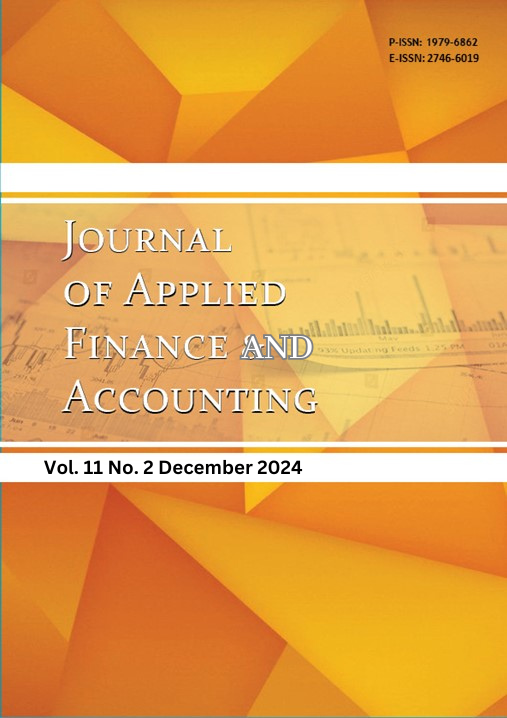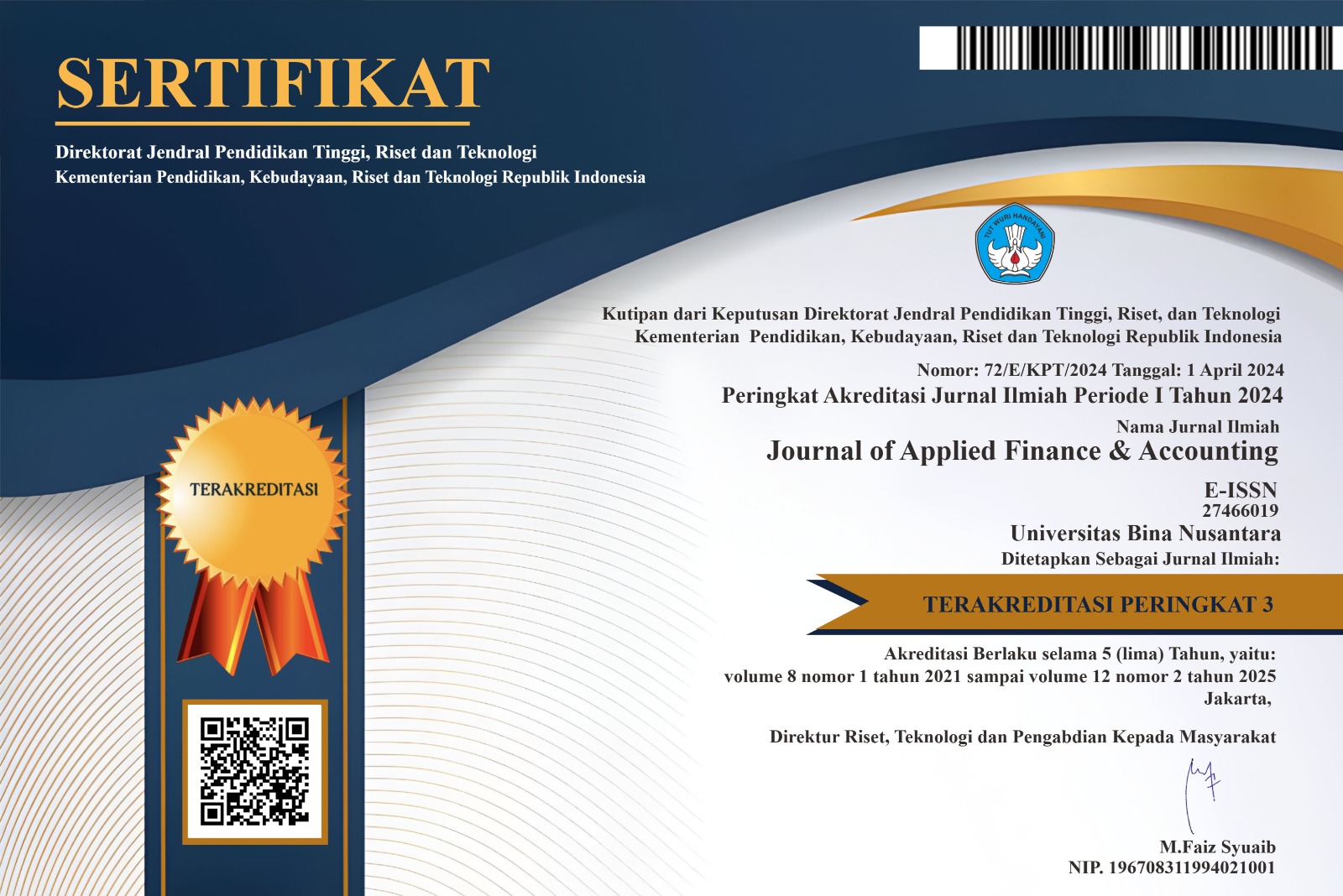THE ROLE OF POLITICAL CONNECTIONS IN MODERATING THE EFFECT OF BOARD DIVERSITY ON FINANCIAL DISTRESS
DOI:
https://doi.org/10.21512/jafa.v11i2.12271Keywords:
Board Diversity, Corporate Governance, Political Connection, Financial DistressAbstract
This research aims to examine the role of political connection in moderating the effect of board gender diversity and board size on financial distress. A sample of 46 banking companies listed in Indonesia Stock Exchange between during the 2021-2023 period was selected using a purposive sampling method. Panel data regression were used for data analysis. The results of the research exhibit that board of commissioner gender diversity has no effect on financial distress; board of director gender diversity has a positive effect on financial distress; and board size has a negative effect on financial distress. Political connections cannot moderate the effect of gender diversity, but can moderate the negative effect of gender diversity and the positive effect of board size on financial distress. This finding, as such, can provide insights for corporate management and regulators to determine the most effective corporate board design to improve the companies financial performance and avoid financial distress.
Keywords: Board diversity; board size; corporate governance; political connection; financial distress
References
Abbas, A., & Frihatni, A. A. (2023). Gender Diversity and Firm Performances Suffering from Financial Distress: Evidence from Indonesia. Journal of Capital Markets Studies, 7(1), 91–107. https://doi.org/10.1108/jcms-12-2022-0045
Agyemang-Mintah, P., & Schadewitz, H. (2018). Gender Diversity and Firm Value: Evidence from UK Financial Institutions. International Journal of Accounting & Information Management, 26(3), 2–26. http://www.wired.com/2013/12/twitter-board-bumbled-gender-issues/,
Ahmad, A. H., Adiana, N., Abdullah, H., Nisham, K., & Mohd, T. (2022). Predicting Restructuring Outcomes of Financially Distressed Firms in Malaysia. International Journal of Economics and Management, 16(1), 107–118. http://www.ijem.upm.edu.my
A
in, Q. U., Yuan, X., Javaid, H. M., Usman, M., & Haris, M. (2020). Female Directors and Agency Costs: Evidence from Chinese Listed Firms. International Journal of Emerging Markets, 16(8), 1604–1633. https://doi.org/10.1108/IJOEM-10-2019-0818
Ali, S., Rehman, R. ur, Yuan, W., Ahmad, M. I., & Ali, R. (2021). Does Foreign Institutional Ownership Mediate The Nexus Between Board Diversity and The Risk of Financial Distress? A Case of an Emerging Economy of China. Eurasian Business Review, 12, 553–581. https://doi.org/10.1007/s40821-021-00191-z
Altman, E. I. (1968). Financial Ratios, Discriminant Analysis and the Prediction of Corporate Bankruptcy. The Journal of Finance, 23(4), 589–609. http://www.jstor.org/about/terms.html.
Azam, A., Khan, I., Fahad, M. S., & Akhtar, M. A. (2023). Prediction of Insolvency by Using Altman Z-score Model: A Study of Selected Indian Private Banks. Boletin de Literatura Oral, 10, 684–695.
Badan Pusat Statistik. (2023a). Berita Statistik 2023. https://www.bps.go.id/id/pressrelease/2024/02/05/2379/ekonomi-indonesia-triwulan-iv-2023-tumbuh-5-04-persen--y-on-y-.html
Badan Pusat Statistik. (2023b). Proporsi perempuan yang berada di posisi managerial menurut provinsi, 2021-2022. https://www.bps.go.id/id/statistics-table/2/MjAwMyMy/proporsi-perempuan-yang-berada-di-posisi-managerial-menurut-provinsi.html
Benkraiem, R., Hamrouni, A., Lakhal, F., & Toumi, N. (2017). Board Independence, Gender Diversity and CEO Compensation. Corporate Governance (Bingley), 17(5), 845–860. https://doi.org/10.1108/CG-02-2017-0027
Cupák, A., Fessler, P., & Schneebaum, A. (2021). Gender differences in risky asset behavior: The importance of self-confidence and financial literacy. Finance Research Letters, 42. https://doi.org/10.1016/j.frl.2020.101880
Fitroni, N. A., & Feliana, Y. K. (2022). Pengaruh Keragaman Gender Pada Dewan Komisaris, Dewan Direksi, dan Komite Audit Terhadap Manajemen Laba. Akuntansi Dan Teknologi Informasi, 15(1), 8–21. https://doi.org/10.24123/jati.v15i1.4575
Galbreath, J. (2018). Is Board Gender Diversity Linked to Financial Performance? The Mediating Mechanism of CSR. Business and Society, 57(5), 863–889. https://doi.org/10.1177/0007650316647967
García, C. J., & Herrero, B. (2021). Female Directors, Capital Structure, and Financial Distress. Journal of Business Research, 136, 592–601. https://doi.org/10.1016/j.jbusres.2021.07.061
Guizani, M., & Abdalkrim, G. (2022). Board Gender Diversity, Financial Decisions and Free Cash Flow: Empirical Evidence from Malaysia. Management Research Review, 45(2), 198–216. https://doi.org/10.1108/MRR-03-2021-0246
Hadi, S., & Anggraeni, A. (2008). Pemilihan Prediktor Delisting Terbaik (Perbandingan Antara The Zmijewski Model, The Altman Model, dan The Springate Model). Jurnal Akuntansi Dan Auditing Indonesia, 12(2). https://journal.uii.ac.id/JAAI/article/view/2263
Hadiputra, A. A., & Windijarto. (2023). Political Connection, Financial Distress and Cost of Debt: Empirical Evidence from Emerging Country. Jurnal Manajemen Teori Dan Terapan | Journal of Theory and Applied Management, 16(2), 368–380. https://doi.org/10.20473/jmtt.v16i2.44853
Harymawan, I., & Nowland, J. (2016). Political Connections and Earnings Quality: How Do Connected Firms Respond to Changes in Political Stability and Government Effectiveness? International Journal of Accounting and Information Management, 24(4), 339–356. https://doi.org/10.1108/IJAIM-05-2016-0056
Ibrahim, R. (2019). Corporate Governance Effect on Financial Distress: Evidence from Indonesian Public Listed Companies. Journal of Economics, Business, & Accountancy Ventura, 21(3), 415–422. https://doi.org/10.14414/jebav.v21i3.1626
Indonesia Stock Exchange. (2023). IDX Yearly Statistics. https://www.idx.co.id/id/data-pasar/laporan-statistik/statistik/
Islam, M. S., Wong, W.-C., & Yusoff, M. Y. bin M. (2022). The Influence of Political Connections and Ownership on Firm Performance in Pakistan. Baltic Journal of Law & Politics, 15(2), 650–667. https://doi.org/10.2478/bjlp-2022-001040
Jensen, M. C., & Meckling, W. H. (1976). Theory of the Firm: Managerial Behavior, Agency Costs and Ownership Structure. Journal of Financial Economics, 3(4), 305–360. http://ssrn.com/abstract=94043Electroniccopyavailableat:http://ssrn.com/abstract=94043http://hupress.harvard.edu/catalog/JENTHF.html
Johnson, B. L. (1995). Resource Dependence Theory: A Political Economy Model of Organizations. https://eric.ed.gov/?id=ED387871
Kalbuana, N., Taqi, M., Uzliawati, L., & Ramdhani, D. (2022). The Effect of Profitability, Board Size, Woman on Boards, and Political Connection on Financial Distress Conditions. Cogent Business and Management, 9(1). https://doi.org/10.1080/23311975.2022.2142997
Khatib, S. F. A., Abdullah, D. F., Elamer, A. A., & Abueid, R. (2021). Nudging toward diversity in the boardroom: A systematic literature review of board diversity of financial institutions. Business Strategy and the Environment, 30(2), 985–1002. https://doi.org/10.1002/bse.2665
Lucas-Pérez, M. E., Mínguez-Vera, A., Baixauli-Soler, J. S., Martín-Ugedo, J. F., & Sánchez-Marín, G. (2015). Women on the Board and Managers’ Pay: Evidence from Spain. Journal of Business Ethics, 129(2), 265–280. https://doi.org/10.1007/s10551-014-2148-1
Maji, S. G., & Saha, R. (2021). Gender diversity and financial performance in an emerging economy: empirical evidencefrom India. Management Research Review, 44(12), 1660–1683. https://doi.org/10.1108/MRR-08-2020-0525
Manzaneque, M., Priego, A. M., & Merino, E. (2016). Corporate Governance Effect on Financial Distress Likelihood: Evidence from Spain. Revista de Contabilidad-Spanish Accounting Review, 19(1), 111–121. https://doi.org/10.1016/j.rcsar.2015.04.001
Muien, H. M., & Nordin, S. (2024). Gender Diversity and Corporate Financial Distress in the Pakistan Stock Market: The Interacting Effect of Family-controlled Companies. Journal of Family Business Management, 14(1), 2–27. https://ssrn.com/abstract=4493524
Muthia, F., Putri, M. A., & Andaiyani, S. (2024). Gender Diversity and Financial Distress: Evidence From Non Financial Companies in Indonesia. Jurnal Riset Bisnis Dan Manajemen, 17(1), 232–128.
Napitopulu, R. B., Simanjuntak, T. P., Hutabarat, L., Damanik, H., Harianja, H., Sirait, R. T. M., & Ria, C. E. (2021). Penelitian Bisnis dengan SPSS STATA dan Eviews (1st ed.). http://repository.darmaagung.ac.id/id/eprint/155/
Nugrahanti, Y. W., Sutrisno, T., Rahman, A. F., & Mardiati, E. (2020). Do Firm Characteristics, Political Connection and Corporate Governance Mechanism Affect Financial Distress? (Evidence from Indonesia). International Journal of Trade and Global Markets, 13(2), 220–250.
Nuswantara, D. A., Fachruzzaman, D. A., Prameswari, R. D., Suyanto, R. D., Rusdiyanto, R., & Hendrati, I. M. (2023). The Role of Political Connection to Moderate Board Size, Woman on Boards on Financial Distress. Cogent Business and Management, 10(1). https://doi.org/10.1080/23311975.2022.2156704
Pfeffer, J., & Salancik, G. R. (1978). The External Control of Organizations: A Resource Dependence Perspective. Harper & Row, New York.
Platt, H. D., & Platt, M. B. (2002). Predicting Corporate Financial Distress: Reflections on Choice-Based Sample Bias. Journal of Economics and Finance, 26(2), 184–199.
Prihatiningtias, Y. W. (2012). Gender Diversity in The Boardroom and Firm Performance: Evidence from Indonesian Publicly Listed Financial Firms.
Purwanto, S., Perkasa, D. H., & Abadi, F. (2023). Assessment of Banking Conditions on Financial Distress During the Period of COVID-19 in Indonesia. WSEAS Transactions on Business and Economics, 20, 467–474. https://doi.org/10.37394/23207.2023.20.42
Ramly, R., Haerani, S., Rura, Y., & Rasyid, S. (2020, June 5). Predicting Financial Distress and Financial Performance Using Political Connection. International Conference on Accounting, Management, and Economics. https://doi.org/10.4108/eai.25-10-2019.2295391
Singh, J., Singhania, S., & Aggrawal, D. (2023). Does Board Gender Diversity Impact Financial Performance? Evidence from the Indian IT Sector. Society and Business Review, 18(1), 51–70. https://doi.org/10.1108/SBR-09-2021-0164
Switzer, L. N., Tu, Q., & Wang, J. (2018). Corporate governance and default risk in financial firms over the post-financial crisis period: International evidence. Journal of International Financial Markets, Institutions and Money, 52, 196–210. https://doi.org/10.1016/j.intfin.2017.09.023
Syamsudin, Setiany, E., & Sajidah. (2017). Gender Diversity and Firm Value: A Study on Boards of Public Manufacturing Firms in Indonesia. Problems and Perspectives in Management, 15(3), 276–284.
Whitaker, R. B. (1999). The Early Stages of Financial Distress. Journal of Economics and Finance, 23(2), 123–133.
Yan, C. C., Hui, Y. Z., & Xin, L. (2021). The relationship between board size and firm performance. E3S Web of Conferences, 257. https://doi.org/10.1051/e3sconf/202125702079
Downloads
Published
Issue
Section
License
Authors who publish with this journal agree to the following terms:
Authors retain copyright and grant the journal right of first publication with the work simultaneously licensed under a Creative Commons Attribution License that allows others to share the work with an acknowledgement of the work's authorship and initial publication in this journal.
Authors are able to enter into separate, additional contractual arrangements for the non-exclusive distribution of the journal's published version of the work (e.g., post it to an institutional repository or publish it in a book), with an acknowledgement of its initial publication in this journal.
Authors are permitted and encouraged to post their work online (e.g., in institutional repositories or on their website) prior to and during the submission process, as it can lead to productive exchanges, as well as earlier and greater citation of published work (See The Effect of Open Access).





